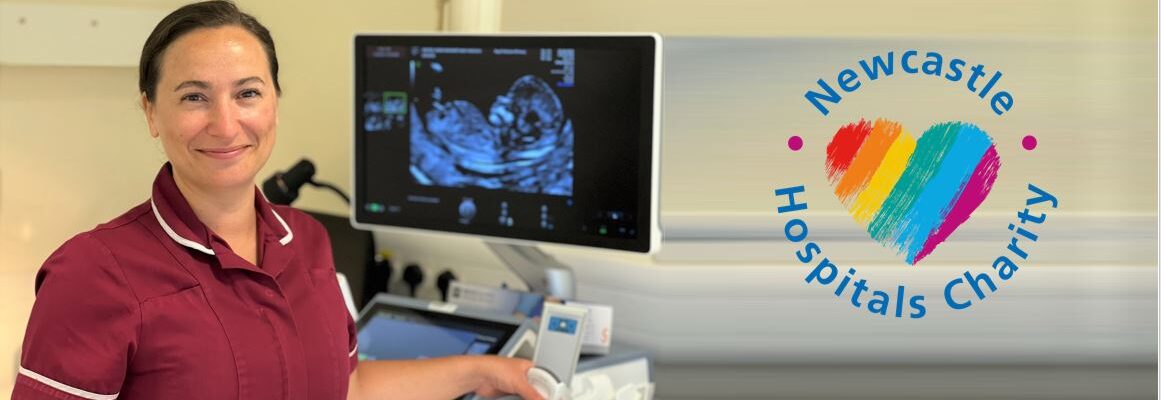One of Newcastle’s first NMAHP Researcher Development Institute Fellows, Raya will carry out a Doctoral Fellowship with the support of the Trust’s NMAHP Research Team.
Raya’s Fellowship aims to develop resources to support women to make informed decision around taking prescribed aspirin during their pregnancy to reduce the risk of pre-eclampsia and the potentially life threatening impact of this serious condition for both mother and baby.
Raya’s Fellowship has been made possible thanks to Newcastle’s RDI funding backed by the Newcastle Hospitals Charity, which will backfill Raya’s clinical role and be used to increase Trust’s clinical and research capacity whilst supporting two joint clinical research roles.
Maternal deaths caused by pre-eclampsia
Pre-eclampsia is responsible for around 45,000 annual maternal deaths around the world, and in the UK somewhere in the region of 16,000 women are affected by the syndrome each year.
There is no cure but low-dose (75-150 mg) aspirin can vastly reduce the risk of developing pre-eclampsia when taken by women with pre-existent risk factors.
Unfortunately, many women do not take aspirin despite it being prescribed.
In recently conducted research project Raya was able to show that sub-optimal adherence can reduce response to aspirin treatment. She also looked at reasons of poor adherence and informational needs amongst pregnant women.
“I’m extremely passionate about improving pregnancy outcomes for patients with pre-eclampsia and their babies”, explains Raya “and I’m also committed to finding new ways of working to support the NHS, its service users and its workforce.”
Supporting women to make positive decisions
Raya continues: “Aspirin has been proven to considerably reduce the risk of developing pre-eclampsia in women with certain risk factors. Yet unfortunately, many women do not take their aspirin as prescribed.
“After looking into the reasons for non-adherence during my pre-Doctoral research, it became clear to me that this challenge could potentially be met by developing a bundle of care or intervention to help women to make a positive decision about taking their prescribed aspirin, and then adhering to it.”
In fact, an international randomised controlled trial (RCT) of 150 mg of aspirin vs placebo (ASPRE), demonstrated that aspirin can reduce the risk of early onset of pre-eclampsia by 41% with adherence < 90%. Not only that but with a very high degree of adherence (> 90%) risk can be reduced by an astounding 76%!
Raya adds “By enabling women to take aspirin and helping them to adhere to the advised regiment we could double the prophylactic effect of aspirin. This in turn will improve both short and long-term health outcomes for mothers and babies, improve service user experience and reduce the strain on the NHS.”
The reasons for not taking aspirin are complex and involve a large number of interlinked factors rooted in personal perceptions and interactions with the health care system. Therefore Raya decided to approach this project using co-productive approach and MRC guide for developing and evaluating complex interventions.
The output has helped to shape the very first attempt to develop a bundle of care to support women to take prophylactic aspirin as prescribed. In Raya’s project, service providers and service users will work together to find an innovative solution that will fit into the current pathway of care.
Three phase approach
This will initially involve working with a range of stakeholders including women, their partners, healthcare professionals and academics as well as interested charities to create a new approach to empower and support women to take their prescribed aspirin.
The second stage will be to trial the care bundle prototype as part of a feasibility and acceptability study.
Finally, the prototype will be refined using the results of the second stage, preparing the prototype to enter a larger trial to test its effectiveness.
“If successful we hope to see the intervention having a number of short- and long-term impacts”, explains Raya. These are expected to include:
Short term:
- Vastly reducing risk of pre-eclampsia from an estimated 76% to 42% leading to:
- reduction in incidence of the occurrence of pre-eclampsia
- reduction in maternal admissions to hospital
- reduction in admissions of premature babies to neonatal unit
Long term:
- Reduction in the risk of developing cardiovascular events in women
- Reduction in prematurity related complications
- Greater satisfaction and improved experience for both our patients and staff
- Improve service capacity having less women requiring hospital admission and monitoring for pre-eclampsia, and babies requiring neonatal support
“Because of the co-productive nature of this project, I will build strong local, national, and international partnerships and will raise Trust’s profile,” adds Raya.
“During my RDI Fellowship thanks to funding support from Newcastle Hospitals Charity, I will be working with service users, Newcastle and Northumbria Universities and University of Twente, NIHR Applied Research Collaboration North East and North Cumbria and two charities SANDS and Action on Preeclampsia.”
Recent papers
You can read some of Raya’s recent research papers here:
In recent research, Ray was able to show that sub-optimal adherence is key for non-response:
Reasons for not taking aspirin are complex. Raya studied barriers and facilitators of adherence to aspirin amongst pregnant women:
She also studied their informational needs:
Could you be one of our next NMAHP RDI Fellows?
If you would like to find out more about becoming one of our NMAHP RDI Fellows, you can go to our Researcher Development Institute webpage.
Watch our NMAHP RDI video
Our animation explains how Newcastle’s NMAHP Researcher Development Institute programme works across the four seasons of the year.
Contact us
Email the NMAHPs Research Team at [email protected]
